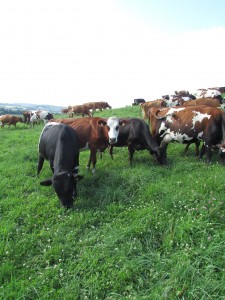This post was written by Kendra Peeples ’16
Kriemhild Dairy Farms of Hamilton, NY operates as a grass-fed dairy farm. Their main product that they sell to the public is their Meadow Butter, and Crème Fraiche, a sour cream styled slightly more towards Europe’s sour cream. I have been working with Lindsey Jakubowski, the General Manager of Kriemhild, to help bring the Dairy Grazing Apprenticeship (DGA) to New York State. This United States Department of Labor recognized apprenticeship program has recently decided to go national and move beyond its home state of Wisconsin. The main tasks that I have been charged with this summer have included reaching out to local farmers to test interest in the program, contact local agricultural organizations for support and networking purposes, and researching funding opportunities.
 The nature of my project this summer is different from typical Upstate Institute projects, because I am working mostly to develop a not-for-profit organization, not to specifically work for one. One of my main difficulties in my project has been reaching out to people with a sense of legitimacy. Lindsey and I have both worried about having the Kriemhild name attached to either of us while we make our contacts, but we have also not been able to come up with an alternative. We believe some farmers would be apprehensive about seeing a different farm’s name attached to something that is supposed to be not-for-profit. We are not working to collect more milk for the Creamery to increase our own production, but that has been a question that has arisen quite often while making contacts. Also, we have tried to not have Colgate listed too closely to my name, because, as one of the women I met with from an agricultural organization said, “Why is a Colgate student working on this and not a Cornell one?” Though Colgate is located in a rural area, the students are far from rural in most cases.
The nature of my project this summer is different from typical Upstate Institute projects, because I am working mostly to develop a not-for-profit organization, not to specifically work for one. One of my main difficulties in my project has been reaching out to people with a sense of legitimacy. Lindsey and I have both worried about having the Kriemhild name attached to either of us while we make our contacts, but we have also not been able to come up with an alternative. We believe some farmers would be apprehensive about seeing a different farm’s name attached to something that is supposed to be not-for-profit. We are not working to collect more milk for the Creamery to increase our own production, but that has been a question that has arisen quite often while making contacts. Also, we have tried to not have Colgate listed too closely to my name, because, as one of the women I met with from an agricultural organization said, “Why is a Colgate student working on this and not a Cornell one?” Though Colgate is located in a rural area, the students are far from rural in most cases.
My work is difficult to quantify because so much has been networking of sorts. We have been in contact with Joe Tomandl III, Director of the DGA, since my first week of work. He, along with his team of program coordinators, have been exceptionally helpful in answering our questions as to how the apprenticeship program works and how best to begin organizing the NYS chapter. Another great aid has been the feedback of one farming married couple in particular. They have hosted apprentices in the past and were able to ask very targeted questions that made Lindsey and I both think more practically about how we could solve future problems between Apprentices and Master Graziers.
I believe the bulk of the data concerning this project will come after several rounds of this apprenticeship are completed. Research has shown that increasing the amount of small (under 100 cows) dairy farms benefits the immediate community, while increasing the larger operations negatively affects income per household. Environmental impacts have shown a little bit of conflicting data, and I am not sure that anyone would be researching those effects, but it does seem that changing from confinement to grazing at a larger scale would positively influence our environmental health.
I think one of the biggest parts of this project is to go forward and see the grass-fed movement spread. At a small scale, there are some benefits, but at a large scale, we can change the negative perceptions of modern farming. The number of ripples that extend out from changing to grass-fed are numerous but will need time to show themselves.

